Exploring the "effortless grace" of theatrical villainy with Baldur's Gate 3's Raphael: "You don't play something that's evil, you play something that's charming"
Interview | BAFTA award-winning actor Andrew Wincott talks Iago, performing a good bad guy, and our curious sympathy with the devil
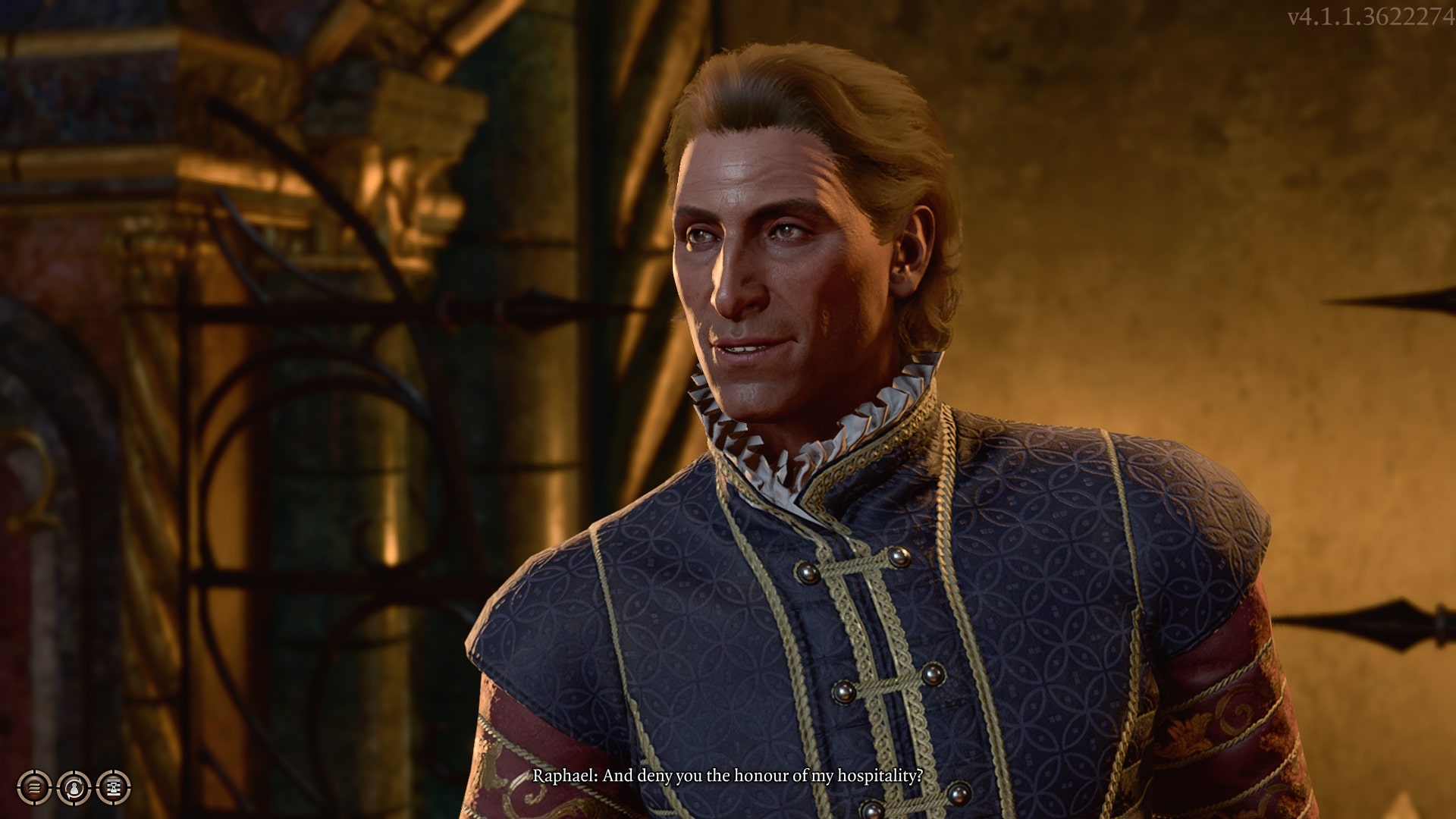
"What's better than a devil you don't know? A devil you do." It's an unforgettable Baldur's Gate 3 line, simple yet effective in establishing the game's most entrancing villain. Actor Andrew Wincott performs not one but two lines of the grandiose speech for me over Zoom, slipping back into the role of Raphael with an easy smirk. Naturally, I meet his words with a face-splitting grin.
We're sitting down to unpick his BAFTA-award winning performance, and examine what makes the devil's brand of smooth-talking wickedness so very charming. Where better to start than with a piece of script that sums up the character's very essence? "Of course, that's all part of his playfulness, his sense of irony, all connected with that charm," Wincott smiles. "But he is nothing if not theatrical."
Crafting a cambion
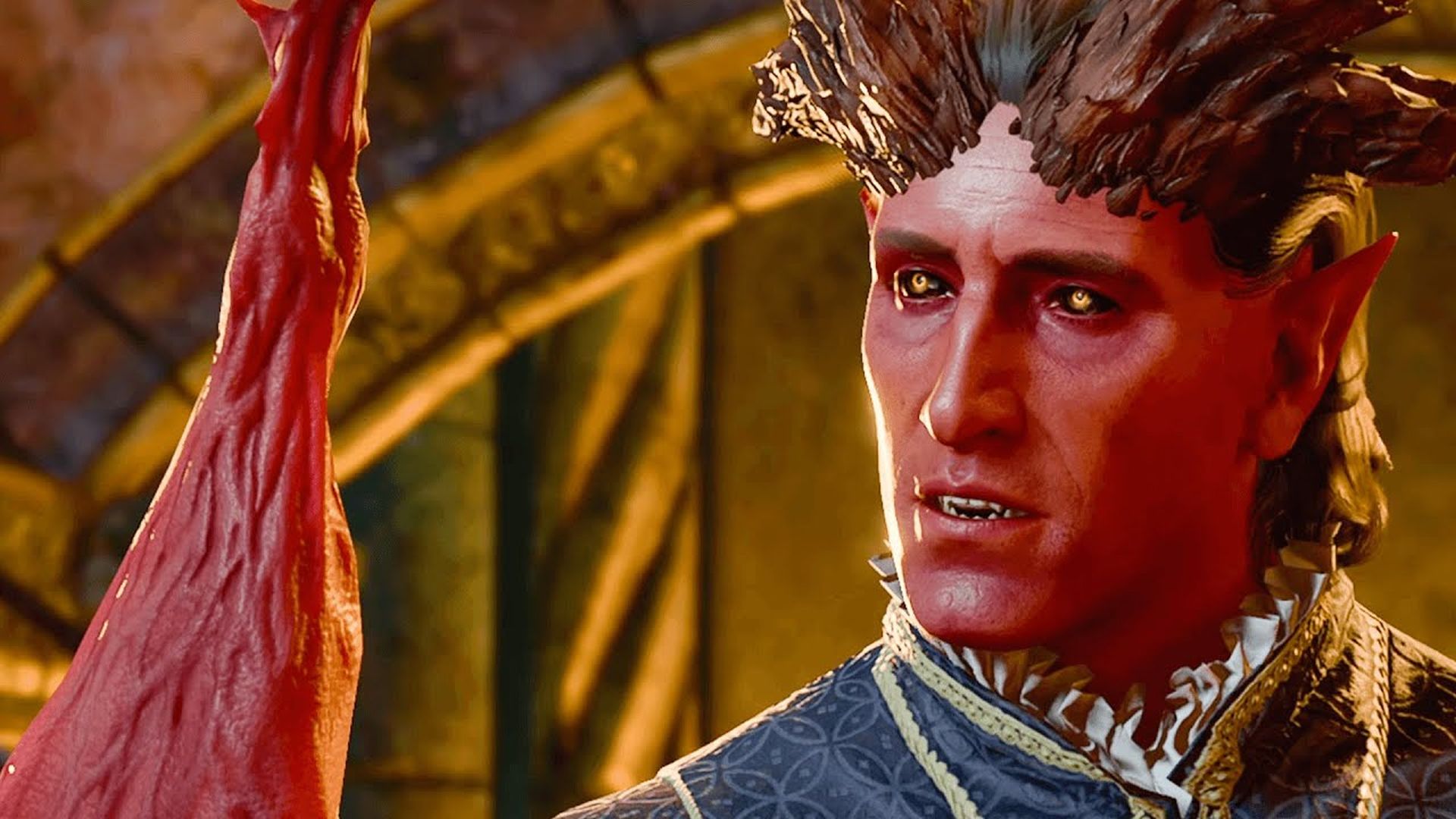

With Wincott's own classical theater training, it makes sense that everything from Raphael's voice to movement feels rooted in dramatic tradition. "Radio really is a physical medium," Wincott explains of the actor's need for physicality even behind the scenes of radio plays and audio books, two mediums Wincott has extensive professional experience with. "Coming back to Baldur's Gate 3, it was also very theatrical because of the nature of it – because of the nature of Raphael. He's still acting using primarily voice, but also gesture. Every line has a sort of physical corollary," he says, flourishing his hands to demonstrate. "There's a sort of elegance about him, I think, that seemed to work for him – a strange, sort of effortless grace for the devil. So that's where I felt it crossed over into theater."
Though Wincott has acted in "hundreds" of video games, he admits that "nothing" has come close to performing in Baldur's Gate 3. He didn't just voice Raphael; he was also strapped into an uncomfortable velcro suit for his first ever stint with full-body motion capture. "When I got into the studio, you know, in the mo cap suit, they said, 'Just angle it slightly,' because you're surrounded by cameras. I suddenly felt I was inhabiting three dimensional space, and it felt like going back on the stage for me, where a lot of my early experience was."
This essence of theater would go on to infuse Raphael's very being. Playing an evil character in a likable way is part of the challenge and fun of the role, but as Wincott suggests, there's a lot more to being a magnetic baddie than having a megalomaniacal cackle. "Villains, they're always kind of the best parts to play," he says, a hint of a smile on his lips. "Not just because they're bad, really – because there's usually some kind of ambiguity to them," explains Wincott of his practical journey through Raphael's methods, motivations, and characterization. "They're not just any one thing. They're a mixture of often contradictory things. So my way into Raphael was to, as the devil, find his charm.
"I'm not playing a kind of thundering villain full of malevolence, you know," he laughs. "You see glimpses of the steel, of the power. But essentially, he's charming and witty and urbane – and that makes him interesting to me." As Larian went on to write the script, using Wincott's own acting strengths to inform them in a sort of "shared process" of creation, Wincott landed right on the money: "You don't play something that's evil, you play something that's charming. I think it's [a line] in Hamlet: 'the devil hath power to assume a pleasing shape.'"
Love is the Devil
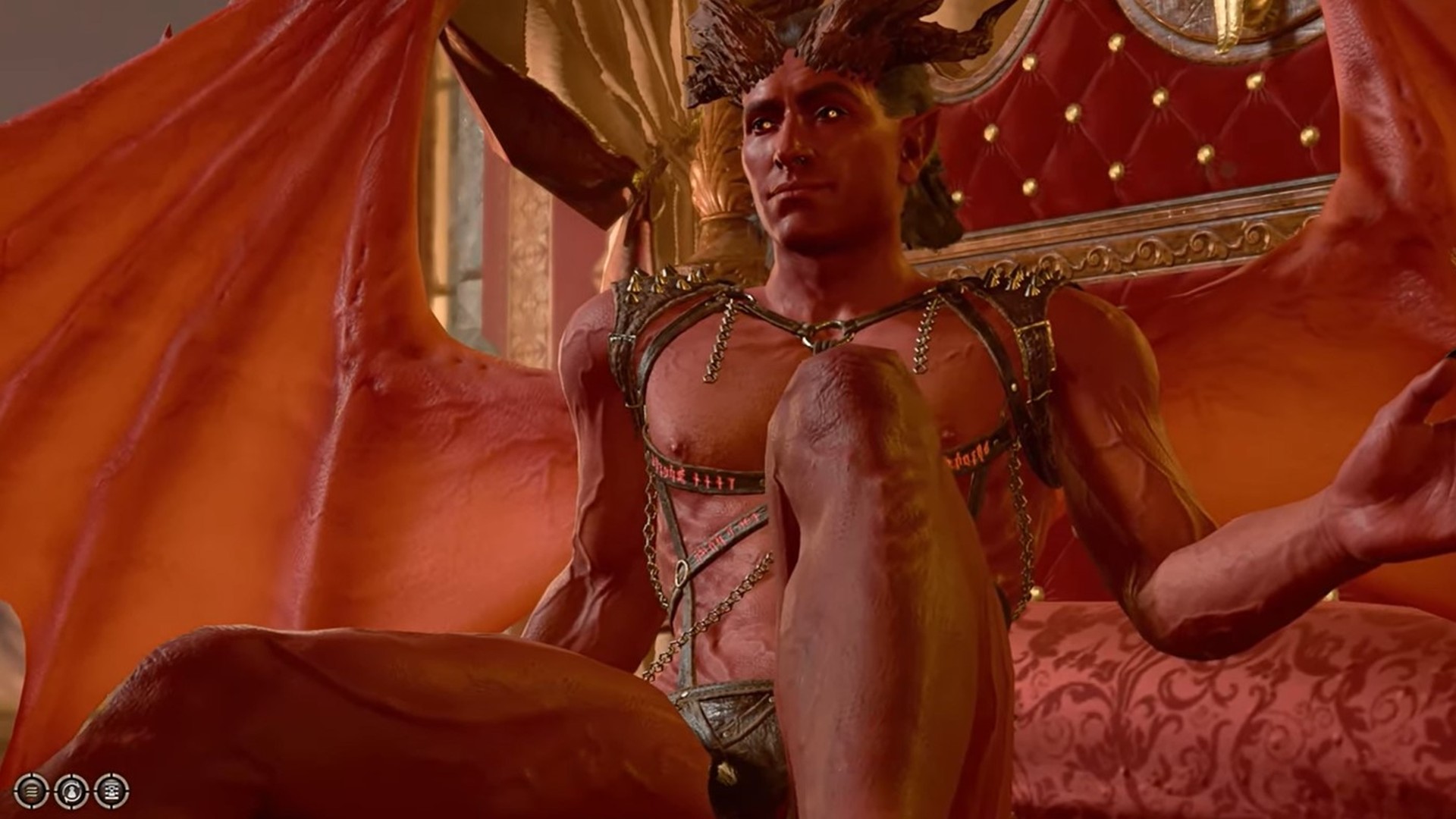
That epilogue does suggest that you might have a DLC. It opens the door to another avenue – an Avernus Avenue.
Andrew Wincott
This 'pleasing shape' is bolstered by Raphael's greatest instrument: his voice. Not only that, but the diction and pentameter of how he actually speaks. "His manner, the language he uses is slightly Baroque," Wincott says, referencing Raphael's clear, confident, yet distinctly old fashioned manner of speech. "And the way I was delivering the lines, they wrote more for me along those same lines. Which was wonderful. I had terrific speeches, and they were a joy to play."
Sign up to the GamesRadar+ Newsletter
Weekly digests, tales from the communities you love, and more
When I offer that his performance feels closest in tone to Iago, the cunning yet charismtic villain of Shakespeare's Othello, Wincott's eyes light up.
"It's interesting you mentioned Iago," Wincott says. "In one of my signing streams, someone asked what lines from Shakespeare would Raphael most connect with, or what character would most resonate with him. And I thought for a moment or two, and then I said, 'Ah, well, Iago,' because he plays with the audience. He plays with the audience's expectations of his villainy. He seems to be doing what [English poet and playwright] Coleridge called 'the motive hunting of motiveless malignity.' So, that's not to say that he doesn't have a motive, but that he sort of creates them and spins them off in an almost sort of random way. It becomes a question of 'which motive is it today?'"
Raphael's constant toying with the player character is part of what makes him so intriguing – he's a devil, yes, but he has an answer for seemingly every problem , even when the party first encounters him with their newly-lodged tadpoles. Yet, his intentions are inscrutable at best. Something in you refuses to trust him, even if another part of you desperately wants to – much like Shakespeare's Iago.
"That's very Raphael-like, I think. Especially [Iago's] line at the end of the play: 'Demand me nothing. What you know, you know. From this time forth, I never will speak word.'" As Wincott speaks, his vocal pitch dropping to a slow, reverberant drawl, I see it again: Raphael, in the flesh. "Perfect tease."
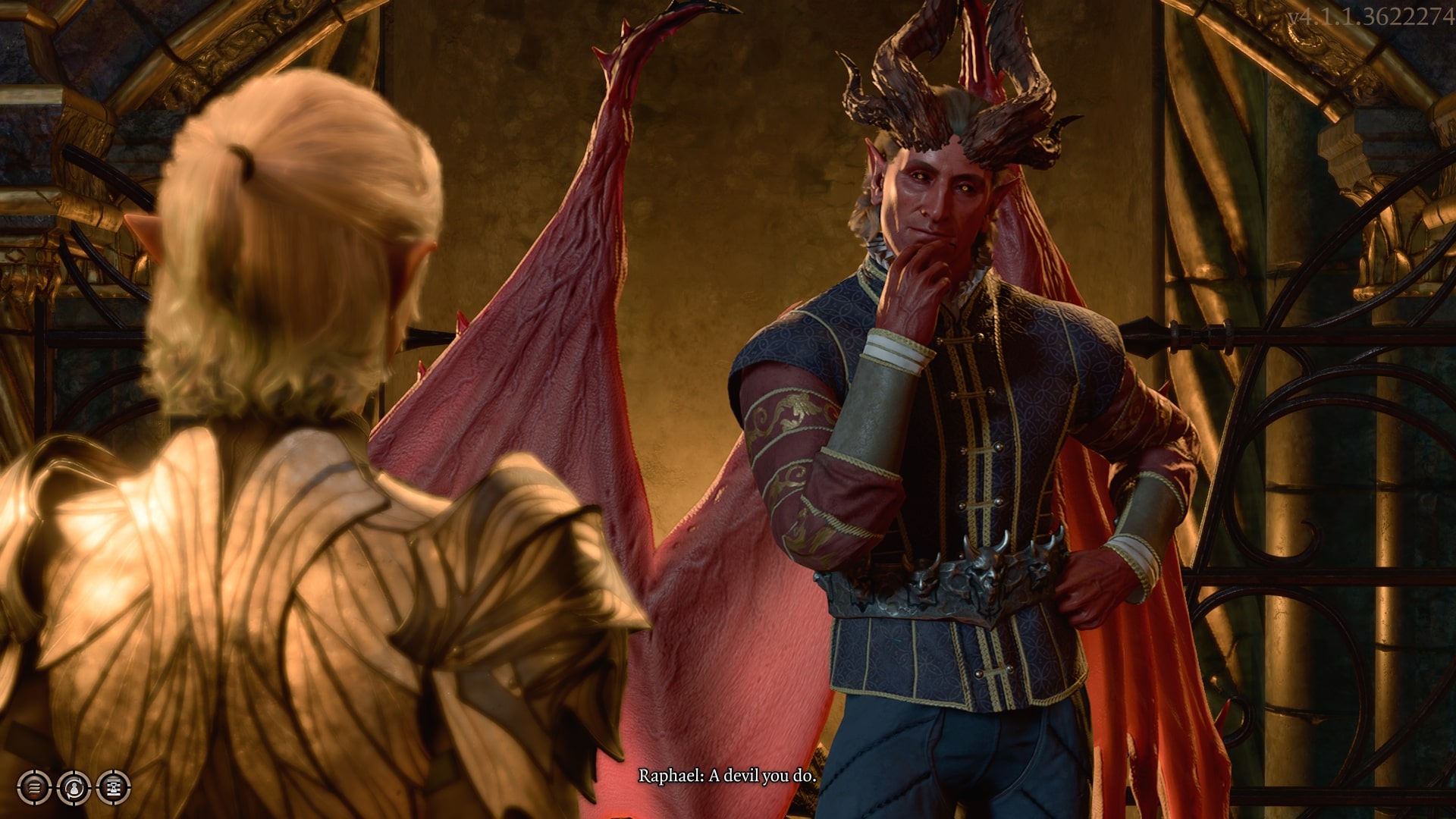
With Raphael's complicated brand of Shakespearean 17th century villainy now well established, we come full circle to discuss another pivotal moment of all-out theatrics. Namely, Raphael's death, and the song he sings to usher in the moment.
"I was slightly apprehensive because it's not something I do, normally – I haven't really done musical theater," Wincott recalls of the moment he was asked to record Raphael's Final Act. With the lines placed into his lap and little else in the way of information, I'm surprised to learn that Wincott had all but a single hour to actually record it with composer Borislav Slavov.
"We ran through it a few times, and then they recorded it a couple of times. And then right at the end of the session, [Slavov] said 'let's do it again – but now, don't think about any things I've been saying. We'll just go for it,'" recalls Wincott. "So in other words, incorporate it, but follow your instincts.
"By then I've got a sense that it was like a stage musical," he laughs. "So it really was, in a way, a sort of stage villain if you like – a Disney villain." It sounds like a frenetic situation to jump into headfirst, but Wincott seems unfazed by everything but the tight turnaround. "By then, nothing really was surprising, so I just went with the flow. But we only had one hour!"
Hell is empty – or is it?
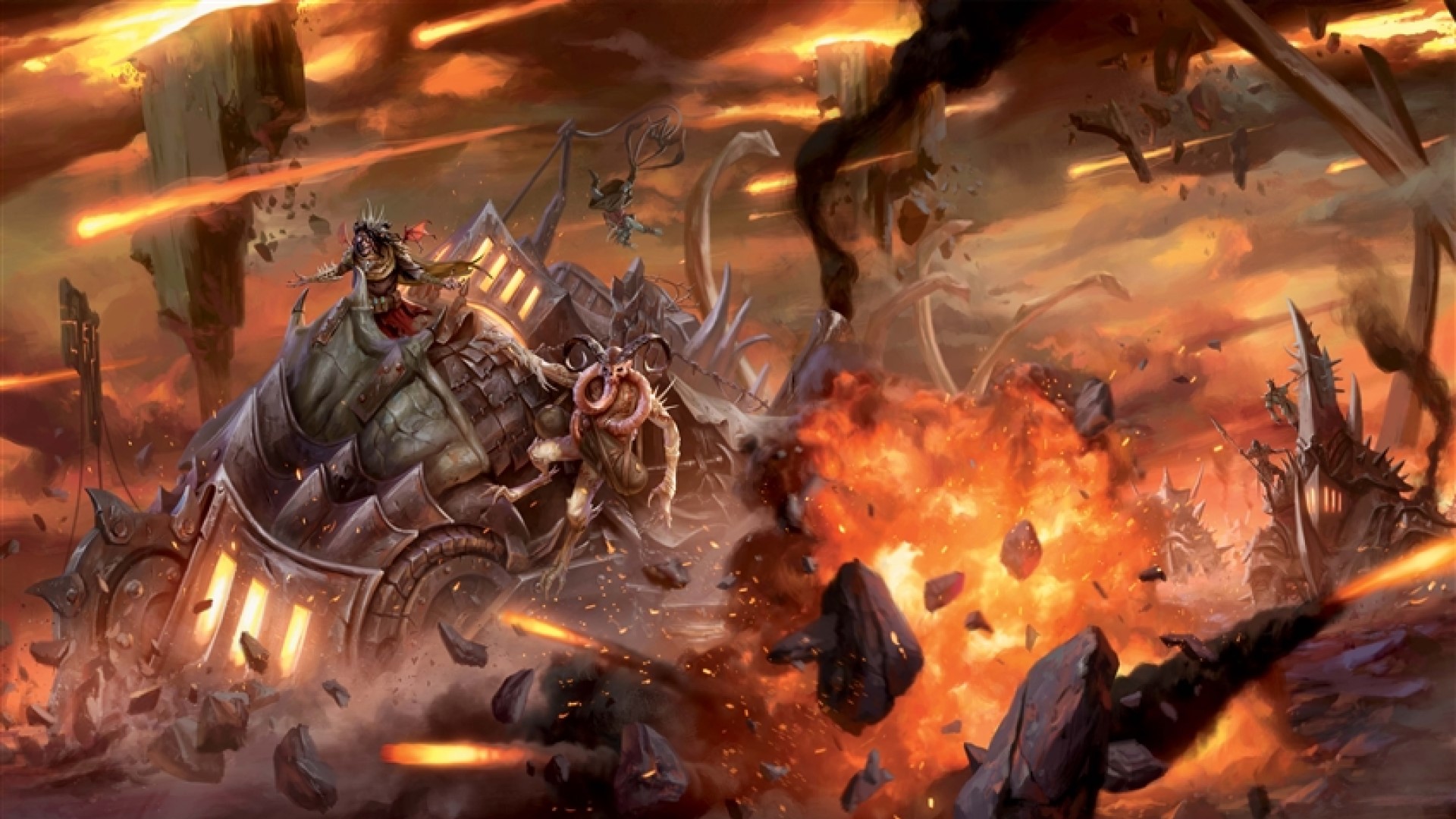
You see glimpses of the steel, of the power. But essentially, he's charming and witty and urbane.
Andrew Wincott
And there, in fair Avernus, is where Raphael would lay his final scene. True, the whole thing is contingent upon whether or not the player chooses to let him keep the Crown of Karsus, but at the same time, Wincott still has hopes for the future of Raphael. Would he be interested in reprising his role someday – perhaps in Baldur's Gate 4, should it ever exist?
"Well, it would be very difficult saying no. Because I think I'm right in saying he is not part of the D&D world – he's something that Larian created, isn't he?" Wincott says, picking his words carefully. "But if he is Larian's creation, he's also mine. I'd love to play him again, but of course, there are a lot of ifs and buts. Someone's got to come along and do it. And someone's got to create something that's as good as Baldur's Gate 3."
It's a high bar, but I can't help but mention bringing up a certain Avernus DLC idea that GR+'s own Joel Franey had in mind, back before Larian shelved plans for additional story content, and Wincott is in firm agreement.
"That epilogue does suggest that you might have a DLC. It opens the door to another avenue – an Avernus Avenue," Wincott jokes, grinning. "I mean, I sort of imagined, or fantasized about [a DLC], and then Larian decided enough was enough, and that was as far as they were going to go – and that's understandable. But that's a great idea," he says finally. "I'm with your friend."
Check out the biggest video game releases still to come in 2024.

Jasmine is a staff writer at GamesRadar+. Raised in Hong Kong and having graduated with an English Literature degree from Queen Mary, University of London in 2017, her passion for entertainment writing has taken her from reviewing underground concerts to blogging about the intersection between horror movies and browser games. Having made the career jump from TV broadcast operations to video games journalism during the pandemic, she cut her teeth as a freelance writer with TheGamer, Gamezo, and Tech Radar Gaming before accepting a full-time role here at GamesRadar. Whether Jasmine is researching the latest in gaming litigation for a news piece, writing how-to guides for The Sims 4, or extolling the necessity of a Resident Evil: CODE Veronica remake, you'll probably find her listening to metalcore at the same time.


